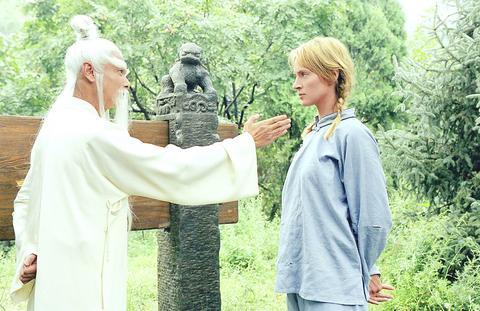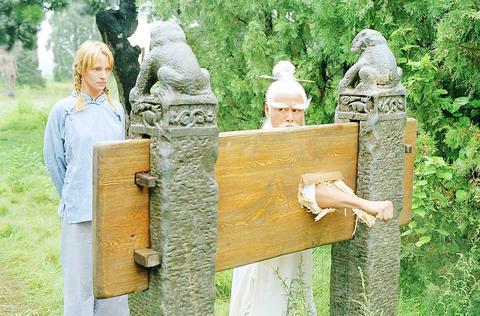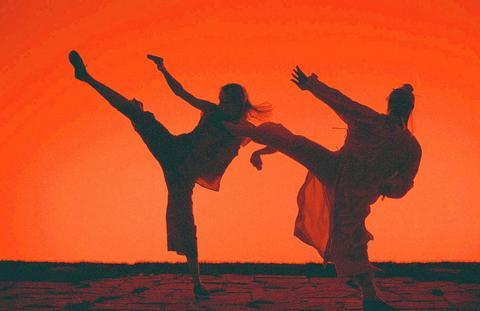When a writer-director -- Cameron Crowe or Paul Thomas Anderson, for example -- is in love with his characters, the fun comes when the filmmaker lets them gab away, inadvertently revealing themselves. The joy when Quentin Tarantino's creations speak is the opposite. Despite their hilariously florid rapping, his folks are also incredibly cagey: They never give the entire game away. This shrewdness is the template for the long dialogues in Kill Bill Vol. 2, the most voluptuous comic-book movie ever made.
In this deliciously perverse picture -- Tarantino delights in distending climaxes and emotional connections for so long we almost forget about conventional satisfactions -- everything is operatic, including the despair and the pauses. This is an epic of Conradian proportions (Robert Conradian proportions). Uma Thurman, whose speaking voice has a lyric, teasing quality -- if Dusty Springfield had been an actress, she would have been Thurman -- is just the performer to convey Tarantino's mordant slyness. (She also shows a rueful expansiveness that gives this film a heart.) His movies are about loss and betrayal, and Kill Bill Vol. 2 is a double-burger helping of those motifs. It is rich, substantial and sustained, yet also greasy kids' stuff, a wrapper filled with an extra large order of chili fries, stained with ketchup, salt and cheese.

PHOTOS COURTESY OF PANDASIA
Kill Bill Vol. 1 was Tarantino's fourth movie, so I suppose that makes Vol. 2 his fourth-and-a-half. Bill was broken into two, and the reasoning behind that decision is now evident. The parts could easily have been edited into, well, a single volume; it was conceived that way. But the two films are very different in tone.

PHOTO COURTESY OF PANDASIA
The first episode was whipped into a tidal wave of blood lust. Unfortunately it was all setup: the longest first act in movie history, staged -- and edited -- like a series of Pablo Ferro trailers. Vol. 2 provides the second and third acts in one convenient serving, told in a languorous flashback-within-a-flashback. It offers long, airy takes that suggest Visconti with attention deficit disorder; in other words it's the narrative style that Sergio Leone employed in The Good, the Bad and the Ugly.
This semisequel, like its predecessor, offers a guided tour of Tarantino's sensibility, loaded as it is with pop-culture references that will sate even the most vulpine appetite for the stuff. (It could be subtitled, They Saved Tarantino's Brain.)

All of the director's musical, film and comic-book loves are on display; he gives much play to the grungy martial-arts melodrama Five Fingers of Death, evoking its use of Quincy Jones' Ironside theme and plucking several other of its plot devices. As befits that kind of density, there are more entrances, back stories and origins in "Vol. 2" than in the first hundred issues of The Amazing Spider-Man, Leone's Man With No Name trilogy and all the Shogun Assassin movies combined.
But unlike the 100m-high hurdles of Vol. 1, Vol. 2 feels like a cross-country run, with hills and long stretches of flatland, as it settles into its casual, carnage-laden pace. It has the wily, extended cadences of Leone's movies, with the first 15 or so minutes filmed in loamy, luscious black-and-white and set in what could only be called exploitation-picture Texas. (What the master cinematographer Vittorio Storaro does with shadow, the director of photography Robert Richardson does with light, painting even the interiors with warm, bright flares. His harsh but loving glow permeates this adventure and, like Storaro's, his signature is instantly recognizable.)
Vol. 2 reprises some of the carnage of Vol. 1, in which the Bride (Thurman) goes maternal and breaks with the female-focused assassin crew managed by Bill (David Carradine) only to be pursued and punished along with the other guests at what would have been her nuptials. The Bride's name is now revealed: Beatrix Kiddo.
Bill isn't just being tender as he wipes her bloody, battered brow and calls her Kiddo; he's being businesslike. (This scene, also in the first film, has an unsettling grandeur; Beatrix's blood is all the more horrifying because it's in black-and-white, evoking B-slaughterhouse classics like The Honeymoon Killers.) When Bill arrives at Beatrix's wedding rehearsal, their entire romantic and professional background comes out, and then Bill and his team of mostly femmes fatales level the entire wedding party.
As in the first film, the Bride is on a mission of vengeance after being shot and left for dead. But this time out she's the unholy ghost, not the Friendly Ghost. Beatrix, who also takes on the nom de guerre Black Mamba, calls her journey "a roaring rampage of revenge." The movie is laden with lurid, revved-up sadism; as visited upon the heroine, it's the kind of violence most often
associated with prefeminist exploitation pictures in which the attacks often had a sexual charge.
By using Thurman in the lead, Tarantino is able to give the suffering an emotional core that a masculine protagonist wouldn't provide and he allows her some of the most primal suffering ever. He has ransacked almost all of the movies he has ever seen, including the obscure 1970s television film The Longest Night. Beatrix's subjection to one particular violation -- the one trap that you think she won't be able to fight her way out of -- is a devastatingly underplayed scene; it's about the danger she hears rather than sees.
Initially racked with terror, she has to focus on the obstacles at hand, so that she can take care of Bill and his gang, including the laconic Bud (Michael Madsen, who wrings every drop of moisture from his lines).
Many of the tortures of the damned that she undergoes come from Elle Driver (Daryl Hannah), the homicidal kitten who has replaced Beatrix in Bill's bed and who finally goes blade to blade with her. Tarantino remembers how convincing Hannah is in her physical arrogance. Displaying her gladiatorial confidence, she swings into battle with Beatrix in the trash confines of a trailer home.
Beatrix's other pummeling comes from her martial-arts master, the kung-fu instructor Pei Mai (Gordon Liu), who early in Vol. 2 trains her in lethal skills that come to the fore in later battles.
With his long cat-hair beard and eyebrows, Liu, a veteran of scores of combat films -- including Vol. 1, in a different role -- returns to his Shaw Brothers roots as he's made up to resemble the blind-vengeance machine of King Hu's Master of the Flying Guillotine. He uses words as weapons, too.
Talk is busting out all over in Vol. 2. That conversational deviousness, which some may mistake for irony, was most visible in Pulp Fiction, released 10 years ago. It is why Samuel Jackson may be the perfect actor for Tarantino. Oddly enough, Carradine is up to the demands of the monologues -- originally written for Warren Beatty -- and he soars with
cunningly self-serving sagacity.
The movie plays on Carradine's persona as Cain, the totemic star of the TV series Kung Fu, referenced by Jackson in Pulp Fiction. Yet Carradine bends the lines to his own shaggy willfulness; he delivers a superman soliloquy lifted, in part, from Jules Feiffer's book The Great Comic Book Heroes, which also summarizes the director's ideas about character.
The immensely talented Michael Parks was also built for Tarantino's volubility. His respect for Parks -- the former Then Came Bronson and Bus Riley -- and Parks' ear for confession is a sign of his appreciation of craft.
But the movie, which quivers with a geek-adrenaline rush, in some ways feels like its time may have passed; it seems like a film Tarantino might have made before Pulp Fiction.
Vol. 2 works like a multimedia mix tape, and Tarantino rides the tempo of his films like a DJ, abetted in the wheel-in-a-wheel trickiness by the deft fingers of his editor Sally Menke. When one of the characters in Vol. 2 makes an offhand remark about "undisputed truth," Tarantino's actual forebear is clear: the R&B producer Norman Whitfield.
With his regal reserves of arrogance and unstated sexual paranoia, Whitfield was the link between Detroit slick (Motown) and funk (Parliament/Funkadelic). While adding a few licks of his own, Tarantino, like Whitfield, gets goose flesh from the evil that lurks within.

The unexpected collapse of the recall campaigns is being viewed through many lenses, most of them skewed and self-absorbed. The international media unsurprisingly focuses on what they perceive as the message that Taiwanese voters were sending in the failure of the mass recall, especially to China, the US and to friendly Western nations. This made some sense prior to early last month. One of the main arguments used by recall campaigners for recalling Chinese Nationalist Party (KMT) lawmakers was that they were too pro-China, and by extension not to be trusted with defending the nation. Also by extension, that argument could be

Aug. 4 to Aug. 10 When Coca-Cola finally pushed its way into Taiwan’s market in 1968, it allegedly vowed to wipe out its major domestic rival Hey Song within five years. But Hey Song, which began as a manual operation in a family cow shed in 1925, had proven its resilience, surviving numerous setbacks — including the loss of autonomy and nearly all its assets due to the Japanese colonial government’s wartime economic policy. By the 1960s, Hey Song had risen to the top of Taiwan’s beverage industry. This success was driven not only by president Chang Wen-chi’s

Last week, on the heels of the recall election that turned out so badly for Taiwan, came the news that US President Donald Trump had blocked the transit of President William Lai (賴清德) through the US on his way to Latin America. A few days later the international media reported that in June a scheduled visit by Minister of National Defense Wellington Koo (顧立雄) for high level meetings was canceled by the US after China’s President Xi Jinping (習近平) asked Trump to curb US engagement with Taiwan during a June phone call. The cancellation of Lai’s transit was a gaudy

The centuries-old fiery Chinese spirit baijiu (白酒), long associated with business dinners, is being reshaped to appeal to younger generations as its makers adapt to changing times. Mostly distilled from sorghum, the clear but pungent liquor contains as much as 60 percent alcohol. It’s the usual choice for toasts of gan bei (乾杯), the Chinese expression for bottoms up, and raucous drinking games. “If you like to drink spirits and you’ve never had baijiu, it’s kind of like eating noodles but you’ve never had spaghetti,” said Jim Boyce, a Canadian writer and wine expert who founded World Baijiu Day a decade